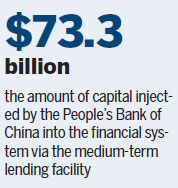Repeat credit crunch unlikely, PBOC-linked newspaper says
(China Daily) Updated: 2017-06-13 07:08BEIJING - China is highly unlikely to see a mid-year liquidity crisis this year and there will be no repeat of the "unusual market fluctuations" seen in June 2013, a central bank-affiliated newspaper said during the weekend.
The Financial News - a publication of the People's Bank of China - dismissed fears of the reoccurring of a mid-year liquidity crunch in the wake of increases to deposit rates at a number of banks.
As China's monetary policy is currently "neither too tight nor too loose," overall liquidity conditions in the banking sector are good, it said in an editorial published on Saturday.
A credit crunch at Chinese banks in June 2013 caused interbank interest rates to surge by double digits and pounded the market, sparking concern among investors.
Only a few banks have increased deposit rates and they do not represent the whole picture, the newspaper said, noting that China's major lenders were stable with healthy debt structures.
Meanwhile, it was normal for commercial banks to adjust deposit rates and the yield rates of certain financial products, it added.

It also addressed fears about capital outflows due to a possible US Federal Reserve rate hike this month, the central bank's macro prudential assessment on commercial banks, and concerns that continued financial tightening and deleveraging would add pressure to market liquidity.
The authorities have already made moves ahead of the expected Fed rate increase, while the macro prudential assessment - a formal evaluation covering loans and other assets, together with the ongoing financial scrutiny - would actually help stem financial risk, the newspaper added.
It said financial institutions and market players should remain rational towards mid-year liquidity conditions by staying vigilant while avoiding panic and chaos.
"There is no need to exaggerate the liquidity risk," it said.
The PBOC injected 498 billion yuan ($73.3 billion) into the financial system via the medium-term lending facility, which was described by the newspaper as "a clear signal" of keeping liquidity "basically stable" by providing medium and long-term funds.
The PBOC-affiliated publication struck a confident tone that the central bank would make similar moves "at any time" based on market conditions to keep market liquidity at a level that is "neither too tight nor too loose."
Xinhua
- 'Cooperation is complementary'
- Worldwide manhunt nets 50th fugitive
- China-Japan meet seeks cooperation
- Agency ensuring natural gas supply
- Global manhunt sees China catch its 50th fugitive
- Call for 'Red Boat Spirit' a noble goal, official says
- China 'open to world' of foreign talent
- Free trade studies agreed on as Li meets with Canadian PM Trudeau
- Emojis on austerity rules from top anti-graft authority go viral
- Xi: All aboard internet express











